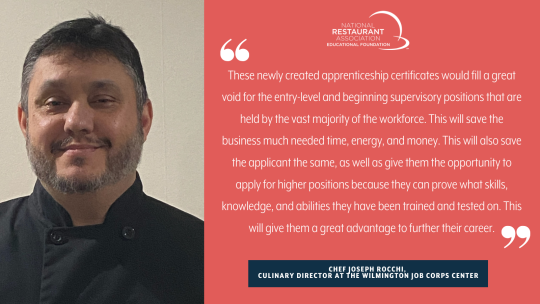NRAEF : Blog
Future Focus: Connecting Opportunity Youth to Apprenticeship

Similar to ProStart, we’re now connecting Restaurant Ready to Line Cook apprenticeship through the US DOL Youth Readiness Apprenticeship Grant, Restaurant Youth Registered Apprenticeship (RYRA). RR participants can now continue their career in restaurants and hospitality upon completing their Restaurant Ready curriculum to earn higher pay right away.
Delaware is one of the four pilot states connected to this work focused on young adults. The Delaware Restaurant Association (DRA) works closely with the Wilmington JobCorps Center to train young adults in Bethany Beach, Delaware. With a huge shortage of properly trained cooks, the program allows the DRA to grow their restaurant workforce directly through the state.
We spoke with Chef Joseph Rocchi, Culinary Director at the Wilmington Job Corps Center, and Raelynn Grogan, Director of Education, Delaware Restaurant Association Educational Foundation, to gain insights on how they think the program is making a positive impact.
How has apprenticeship proven to be a benefit for the workforce and restaurant businesses in Delaware?
Chef Rocchi: One of the major reasons for turnover in the hospitality field is conflict created on the job. Employees don’t have defined standards for their job. This creates many issues not the least of which is quality of work and economy of time and supplies. Employees that have a clear expectation of what the job is, how it should be done, by when, and to what standard are happier, better organized, and thus more successful. This leads to a more successful operation in general.
Grogan: We know that the restaurant/foodservice industry in Delaware is hiring—and we need skilled workers to fill these crucial roles. The restaurant industry is an economic force – contributing over $2.5 billion in sales each year and being the single largest small business employer in the state. The Delaware Restaurant Association (DRA), and its philanthropic arm – the DRA Educational Foundation (DRAEF) exists to promote and sustain the industry… to provide training and workforce development for a host of populations, including Delaware’s youth (through our ProStart Program), and those that may be under/unemployed or struggling to gain experience and skills as they reenter society after justice involvement.
We’ve recently partnered with the Delaware Department of Labor (DDOL) on a registered Cook Apprenticeship Program, and soon-to-begin Pre-Apprenticeship & Restaurant Youth Registered Apprenticeship Programs in Delaware. The DRA manages hundreds of association members throughout the state, with active discussion and suggestions from our active Board of Directors on issues such as identifying industry needs, possible training opportunities, and education on employee retention and development. All of our association members (and Board members) are potential employers and possible partners for our continued educational and workforce development efforts, and we’ve demonstrated the successful convening of these employers with recent projects like our pilot Delaware Cook Apprenticeship Program (DECAP) with SoDel Concepts, and our HR Certificate Program with the University of Delaware (and multiple employers/students enrolled throughout the state).
Would you recommend apprenticeship to other businesses/youth-serving organizations, and if so, why?
Chef Rocchi: Absolutely! These certificates of apprenticeship give the successful recipient something tangible to show what skills that they have acquired when speaking to a potential employer or recruiter for higher education. This will set them far above other candidates.
Grogan: In recent years, the DRAEF has built upon the success of its current educational services, workforce development efforts and proven partnerships with other state agencies by expanding apprenticeship programs in Delaware. Apprenticeships are an employer-driven model that combines on-the-job learning with related classroom instruction to increase skill level and economic mobility. Apprenticeships are a proven solution for companies to recruit, train, and retain highly skilled workers, putting employees on a career path resulting in greater success and earning higher wages. Hospitality is a high-growth career industry with much potential for qualified workers, with pathways to move quickly through the ranks to supervisory and management positions. The hospitality industry is expected to grow by nearly 10% in the next 10 years – adding nearly 5,000 jobs in Delaware alone (National Restaurant Association).
Can you speak specifically to how apprenticeship has changed the lives of young adults in Delaware for the better?
Chef Rocchi: For many years, there have only been a few Culinary certifications that hold any weight in the industry. And those certificates are not mandatory for most sectors of the industry in general… Of those available, they were only for the upper echelons of the industry, which, depending on your sector, can take anywhere from 5 to 15 years to achieve or more. These newly created apprenticeship certificates would fill a great void for the entry-level and beginning supervisory positions that are held by the vast majority of the workforce. Never again would you have to decipher through applications, ask numerous basic questions in an interview, and bring people in for numerous “trailing” shifts to gauge what skills an applicant has. You will now be able to see a tangible certificate of training and know 100% what skill set the applicant should have. This will save the business much needed time, energy, and money. This will also save the applicant the same as well as give them the opportunity to apply for higher positions because they can prove what skills, knowledge, and abilities they have been trained and tested on. This will give them a great advantage to further their career.
Grogan: Two of our four DECAP Pilot Apprentices have already been promoted to Sous Chef within the DECAP Program. 65% of all jobs now require a postsecondary credential or specialized training. In a Society of Human Resources Management poll, more than half of employers reported they were unable to recruit workers for open positions. According to the Bureau of Labor Statistics, middle skill jobs account for 51% of Delaware’s labor market, but only 44% of the state’s workforce are trained at a middle-skill level. Our best chance of preparing students for the jobs of the future is by addressing the skills gap and putting more underserved students on the pathway to career success and sustained economic mobility.
Latest Blog Posts
National Apprenticeship Week – November 13-19, 2023
This week, the NRAEF is honoring the value of restaurant apprenticeship in building industry careers for workers from all backgrounds.
Hospitality Pathways Conference In Review
NRAEF : BlogThis past week, the...
Mini Docs | Teen Chefs, Big Dreams (ProStart on Public TV)
A documentary that tells the inspiring story of the 2023 ProStart® teams and educator from Wilbur Cross High School in New Haven, CT as they work toward the ProStart competitions.
PODCAST – CEO Series: How NRAEF Programs Build a Strong Workforce and Industry
NRAEF CEO Michelle Korsmo speaks with former Board Chair Kent Walrack and current Chair James Fripp about the continued success of the foundation’s programs
PODCAST – ProStart: Educating Tomorrow’s Industry Leaders
Chef Patrick Phelan, 2023 ProStart® Teacher of the Year, shares insights on mentoring the next generation of restaurant workers and the value of the ProStart Program’s hands-on curriculum! Phelan was just recognized on-stage during the 2023 National ProStart Invitational in Washington, DC.
